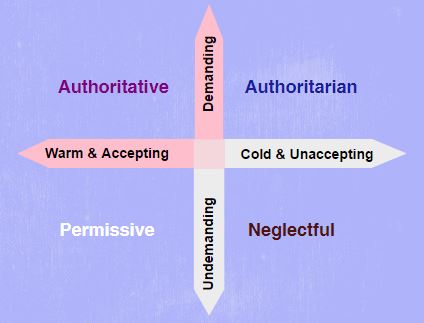Effective Transition Practices: Supporting Family Choice at Age 3
Diana Baumrind'southward Parenting Styles Theory | Statistics | Infographic | Definition and Furnishings on Kids | The Most Constructive Parenting Style | Nature vs Nurture | Quiz
What Is A Parenting Way?
The parenting styles commonly used in psychology today are based on the work of psychologist Diana Baumrind, a developmental psychologist at the University of California at Berkeley, in the 1960s. Maccoby and Martin also contributed past refining the model in the 1980s.
Diana Baumrind's Parenting Styles Theory
Baumrind noticed that preschoolers exhibited distinctly unlike types of behavior. Each type of beliefs was highly correlated to a specific kind of parenting.
Baumrind's theory is that there is a close relationship between the blazon of parenting style and children'south behavior. Dissimilar styles of parenting can lead to different child development and child outcomes.
Based on all-encompassing observation, interviews, and analyses, Baumrind initially identified these three parenting styles: authoritative parenting, authoritarian parenting, and permissive parenting ane .

Although Diana Baumrind is known for her work on categorizing parenting styles, Maccoby and Martin (1983) were the ones who expanded this 3-parenting-styles model using a 2-dimensional framework 2 .
They expanded Baumrind'due south permissive parenting style into ii different types: permissive fashion (too known every bit indulgent parenting style) and neglectful parenting (besides known as uninvolved parenting style).
These iv parenting styles are sometimes called the Diana Baumrind parenting styles or Maccoby and Martin parenting styles.
The four types of parenting styles are:
- Administrative
- Authoritarian (or Disciplinarian)
- Permissive (or Indulgent)
- Neglectful (or Uninvolved)
Statistics on Parenting Styles
In the Usa, roughly 46% of parents use authoritative parenting style, 26% authoritarian parenting fashion, 18% permissive parenting manner, and 10% neglectful parenting style 3 .
The distribution is relatively stable within the population, except that European-American parents are about ii% more than likely to have an authoritative style, while Asian-American parents are two% more than probable to take an authoritarian style.
Parenting Styles Chart Infographic

Parenting Styles Definition and Their Effects on Children's Behavior
Parenting styles are categorized based on ii dimensions of parenting behavior and styles:
Demandingness refers to the extent to which parents control their child's beliefs or demand their maturity.
Responsiveness refers to the degree to which parents are accepting and sensitive to their children's emotional and developmental needs.
Here are the impacts of parenting styles on child evolution.


High demandingness. High responsivenss.
Authoritative parents accept loftier expectations for accomplishment and maturity, but they are as well warm and responsive 4 .
These parents ready rules and enforce boundaries by having open discussions, providing guidance, and using reasoning.
These parents provide their kids with reasoning and explanation for their actions. Explanations allow children to have a sense of awareness and teach kids near values, morals, and goals.
Their disciplinary methods are confrontative 5 , i.e. reasoned, negotiable, consequence-oriented, and concerned with regulating behaviors.
Administrative parents are affectionate and supportive. They respect their children'southward autonomy, provide them with a lot of liberty and encourage independence.
They also allow bidirectional communication. This style of parenting is also known every bit the democratic parenting mode vi .
Children of administrative parents are cherished.
Based on Baumrind'due south research on parenting styles, children of authoritative parents tend to 7 :
- Appear happy and content.
- Are more contained
- Are more active 8 .
- Reach higher academic performance viii–x .
- Develop proficient self-esteem 11 .
- Collaborate with peers using competent social skills 12 .
- Have better mental health — less depression, anxiety, suicide attempts, malversation, alcohol and drug use 13–fifteen .
- Showroom less trigger-happy tendencies xvi .
- Are deeply fastened.

2. Authoritarian Parenting
High demandingness. Low reponsiveness.
Loftier levels of parental control and low levels of parental responsiveness are the ii characteristics of the authoritarian style.
Although disciplinarian parenting and authoritative parenting styles have similar names, they have several important differences in parenting belief, need, and approach.
While both parental styles demand high standards, disciplinarian parents demand bullheaded obedience using reasons such as "because I said so". They only allow one-way communication through strict rules and orders. Whatsoever attempts to reason with them are seen every bit backtalk.
These parents utilise stern discipline and often employ harsh punishment, such equally corporal punishment, as a fashion to obtain behavioral control. Their disciplinary methods are coercive v , i.due east. arbitrary, peremptory, domineering, and concerned with marking status distinctions.
Authoritarian parents are unresponsive to their child's needs and are generally not nurturing. They usually justify using mean treatment to toughen up their kids.
Children whose parents have an authoritarian parenting fashion tend to:
- Accept an unhappy disposition.
- Be less independent.
- Appear insecure.
- Possess depression self-esteem.
- Exhibit more behavioral problems or conduct issues 17 .
- More temper tantrums.
- Perform worse academically.
- Accept poorer social competence.
- Exist more prone to mental issues 18 .
- Be more likely to take drug use issues 19 .
- Have worse coping skills 20 .

3. Permissive Parenting (Indulgent)
Depression demandingness. Loftier responsiveness
Permissive parents set very few rules and boundaries and they are reluctant to enforce rules.
These indulgent parents are warm and indulgent merely they exercise not similar to say no or disappoint their children.
Children of permissive parents tend to have the worst outcomes:
- Cannot follow rules.
- Have worse self-control.
- Possess egoistic tendencies.
- Come across more than problems in relationships and social interactions.

4. Neglectful Parenting (Uninvolved)
Low demandingness. Low responsiveness.
Neglectful parents exercise not fix firm boundaries or high standards.
They are indifferent to their children's needs and uninvolved in their lives.
These uninvolved parents may accept mental issues themselves such every bit depression, physical abuse, or kid neglect when they were kids.
Children of neglectful parents:
- Are more impulsive.
- Cannot self-regulate emotion.
- Encounter more delinquent behavior and addictions problems.
- Accept more than mental issues — eastward.g. suicidal behavior in adolescents.

Which Parenting Style Is The Most Effective?
From decades of studies, research shows that administrative parenting is consistently linked to the all-time outcomes in kids.
The authoritative parenting style is considered the all-time parenting style by psychologists and psychiatrists.
This classification of child rearing styles has been studied for over 25 years in different countries.
Results are generally found to be as expected for each parenting mode.
However, inconsistencies and exceptions in some areas remain.
Here are some important factors that may besides play a part in determining how a kid turns out.
Cultural and Ethnics Differences
Some studies found that the authoritative style isn't always linked to the best school achievement across families from diverse indigenous (e.one thousand. Asian, Black, Hispanic) and socioeconomic backgrounds (e.1000. income level, parental education, number of active parents) 21 .
For example, in 1 study, researchers institute that African-American students with authoritative parents but without peer support did not perform the best academically.
As for Asian-American students, in some studies, they performed the best in school when they had disciplinarian parents and peer back up 22 .
In Spain, a study showed that both indulgent and authoritative parenting styles were associated with positive outcomes 23 .
Kid Temperament
Children's ain behavior can affect the parent'south choice and the outcomes, too.
For example, kids with a more sensitive temperament may be perceived every bit difficult causing the parents to alter their parenting mode towards more authoritarian.
In a study, it was also found that some aspect of child behavior such as sociable and aggressive behaviors are improve correlated to the child's temperament than to the parenting style of their parents.
It seems like parenting style is not the only determining cistron in the child'due south outcomes.
Differences in social context and in child temperaments can make a difference, likewise.
But it is worth noting that, despite existence widely publicized, non all of these report results have been successfully reproduced by other researchers.
In addition, these results are also not consistent across other types of outcomes, such as behavior or mental wellness.
For example, while some studies found the use of disciplinarian parenting in the Chinese American population was associated with the best academic outcomes 24 , others found the authoritative parenting to be the all-time in predicting school performance 25 .
To this date, no written report has conclusively disproved the benefits of authoritative parenting, while many others have consistently shown its advantages.
Authoritative parenting is nonetheless the most encouraged parenting style in modern America every bit recommended past experts.
Parenting Styles vs Parenting Practices
Some other component that can touch the outcome is the distinction betwixt parenting style and parenting practise.
Parenting way is the emotional climate and control in which parents heighten their children.
Parenting practices are specific actions that parents employ in their parenting.
Even for parents with the same parenting style, they may cull to different ways or unlike approaches to implementing specific parenting practices and that will affect the degree of outcomes.
Limitations And Criticisms Of Parenting Studies
When interpreting research results, information technology is important to notation that about of these parenting studies only notice links between parenting styles and outcomes.
That is, the results are only correlation and not causation.
For example, parents who are warm and responsive tend to accept children who exhibit less beliefs issues. One is tempted to say that therefore warm and responsive parents result in better behaving kids.
Just you tin can easily turn that around and say that kids who behave cause their parents to be more warm and responsive.
Dissimilar children have different temperaments and they can, in plow, bear on parents' behavior.
These parenting research does not tell us which one is the correct cause-and-effect human relationship.
And so why do virtually psychologists and experts yet recommend authoritative parenting style?
One reason is that in that location are overwhelming volumes of studies showing these connections consistently.
Another reason is that there is no inquiry that shows authoritative parenting style causes harm to children.
Equally a parent, if I have to choose one parenting style, without whatsoever research data, I would consider my parenting goals and the type of parent I want to be.
My ultimate parenting goal is to raise a healthy, happy, kind, and responsible person who will dear me and our family when she grows up. AND I also want to savor the experience of parenting.
It is hard to imagine being cold and strict (disciplinarian), cold and indifferent (neglectful), or warm and indulgent (permissive) will achieve all of my goals.
The authoritative parenting style simply makes sense to me.
Which parenting manner is most encouraged in modern America?
Of the four Baumrind parenting styles, the authoritative parenting way is the ane that is most encouraged in modern American society.
Also Meet: Montessori Parenting
Nature Vs Nurture

Nature vs nurture is one of the oldest debates in the history of psychology. Which one matters more?
A recent study by the Queensland Brain Institute and the VU Academy of Amsterdam has pretty much settled the Nature vs Nurture debate. 14.five one thousand thousand pairs of twins from nearly every twin study e'er done in the past fifty years were collected and analyzed 26 .
Researchers have found that a person's behavior and grapheme traits are influenced roughly the same by genetics (nature) and past environment (nurture).
Parenting is i of the most important parts of the environment a child is exposed to since birth. Good parenting's impact on a child is significant and undeniable.
Also See: How Does The Expiry Of A Parent Affect A Child
Different parenting styles
A number of new forms of parenting have surfaced in recent years, and those ideas describe today's parenting styles perfectly. These are a few of the most popular parenting styles in the United States today.
Zipper parenting
Attachment parenting is a style of parenting aimed at meeting the emotional needs of infants responsively through shut physical contact and emotional attunement.
Parents create a positive, warm and safety surround where their children can develop trust and closeness. They also requite their child enough fourth dimension to experience comfortable and familiar with the earth.
In 1993, William Sears' volume about attachment parenting popularized this parenting fashion. Parenting practices he recommends are based upon the Attachment Theory developed by psychiatrist John Bowlby.
In Baumrind'due south parenting manner prototype, attachment parenting emphasizes responsiveness. Since information technology focuses on a baby's early years, there are no references to parents' demands.
Children with responsive parents tend to have 27
- More cognitive competence
- Better Communication
- Healthier social-emotional evolution
Helicopter parenting
Helicopter parenting is a term used to describe the over-protective attitude and constant interest of parents with their children.
A helicopter parent hovers over their kid, monitors, and controls every aspect of their children'due south lives, and steps in whenever a trouble arises. They tend to command the surroundings and activities that the child participates in, forcing them to conform to the parent'south expectations, while at the same time depriving them of the take a chance to learn things on their own. This parenting fashion often interferes with a child's development and leads to negative results.
This parenting fashion does not fit neatly under any of Baumrind'southward categories. Helicopter parents are typically insensitive to the child'due south emotional needs. When the child fails to alive up to their high expectations, these parents leap in to assist. Therefore, this parenting way is close to disciplinarian.
Children raised by helicopter parents tend to have
- Lower cocky-esteem 28
- Fright of failure
- More likely to develop disorder such equally anxiety, depression and drug abuse 29
- Poor stress coping skills xxx
- Less independent
Tiger parenting
Tiger parenting is a strict parenting way. It is alleged to be a common parenting style among Chinese American families, but research has proven otherwise 31 .
It is characterized by a very strict and harsh set up of rules and regulations. Tiger parents create a very rigid surround where the children accept very trivial freedom or choices. Emotional abuse such as shaming and insulting is often used to force children to comply.
A tiger parenting way exemplifies the authoritarian parenting fashion.
Children of tiger parenting are more probable to have:
- Lower academic performance
- Less sense of family unit obligation
- More depressive symptoms
Free-range parenting
Free-range parenting is the practice of assuasive children to be more independent than traditional parenting would allow. It is the antithesis of helicopter parenting.
Free-range parents allow children to make decisions and develop a strong sense of responsibleness for their own lives. In a free-range household, there is less control, less supervision, and more liberty. Children tin can explore their environment and develop into independent adults. They make choices and learn from the consequences of their choices.
This parenting style emphasizes the child's right to make decisions and has been described as a natural parenting style that emphasizes cocky-direction and respect for the kid'due south needs.
These parents are sometimes accused of neglect in the United States, although the definition of child fail is sufficiently vague.
According to Baumrind's parenting classification, neglectful parents are common cold and unresponsive and have no demands or expectations from their children. Nonetheless, free-range parents can indeed be warm and responsive to their children, but merely believe that children should be given more liberty and autonomy 32 .
Parenting Way Quiz
To discover out your parenting style, try this test at PsychCentral.
References
-
2.
Maccoby EE, Martin JA. Socialization in the Context of the Family: Parent-Child Interaction. In: Handbook of Child Psychology. Socialization, Personality, and Social Development. ; 1983:.
-
3.
Pong S ling, Johnston J, Chen V. Authoritarian Parenting and Asian Boyish Schoolhouse Performance: Insights from the United states of america and Taiwan. International Journal of Behavioral Evolution. Published online November 6, 2009:62-72. doi:ten.1177/0165025409345073
-
4.
Darling Northward, Steinberg L. Parenting style as context: An integrative model. Psychological Bulletin. 1993;113(39):487-496.
-
v.
Baumrind D. Differentiating between Confrontive and Coercive Kinds of Parental Ability-Assertive Disciplinary Practices. Human Development. Published online 2012:35-51. doi:x.1159/000337962
-
vi.
Miklikowska Yard, Hurme H. Democracy begins at home: Democratic parenting and adolescents' support for autonomous values. European Journal of Developmental Psychology. Published online June 28, 2011:541-557. doi:x.1080/17405629.2011.576856
-
7.
Steinberg L, Lamborn SD, Dornbusch SM, Darling N. Impact of Parenting Practices on Adolescent Achievement: Administrative Parenting, School Involvement, and Encouragement to Succeed. Kid Development. Published online Oct 1992:1266. doi:10.2307/1131532
-
8.
Spera C. A Review of the Human relationship Amongst Parenting Practices, Parenting Styles, and Adolescent School Achievement. Educ Psychol Rev. Published online June 2005:125-146. doi:x.1007/s10648-005-3950-1
-
ix.
Nyarko K. The influence of authoritative parenting style on adolescents' bookish achievement. AJSMS. Published online September 2011:278-282. doi:10.5251/ajsms.2011.two.3.278.282
-
10.
Strage A, Brandt TS. Authoritative parenting and higher students' academic adjustment and success. Journal of Educational Psychology. Published online 1999:146-156. doi:x.1037/0022-0663.91.i.146
-
eleven.
McClun LA, Merrell KW. Relationship of perceived parenting styles, locus of control orientation, and self-concept among inferior loftier age students. Psychol Schs. Published online Oct 1998:381-390. https://psycnet.apa.org/record/1998-12495-009
-
12.
Rankin Williams Fifty, Degnan KA, Perez-Edgar KE, et al. Impact of Behavioral Inhibition and Parenting Fashion on Internalizing and Externalizing Problems from Early Childhood through Adolescence. J Abnorm Child Psychol. Published online June 12, 2009:1063-1075. doi:10.1007/s10802-009-9331-3
-
thirteen.
Rothrauff TC, Cooney TM, An JS. Remembered Parenting Styles and Adjustment in Heart and Late Machismo. The Journals of Gerontology Serial B: Psychological Sciences and Social Sciences. Published online January i, 2009:137-146. doi:10.1093/geronb/gbn008
-
14.
Newman K, Harrison Fifty, Dashiff C, Davies Southward. Relationships between parenting styles and chance behaviors in adolescent health: an integrative literature review. Rev Latino-Am Enfermagem. Published online February 2008:142-150. doi:10.1590/s0104-11692008000100022
-
fifteen.
Zeinali A, Sharifi H, Enayati M, Asgari P, Pasha G. The mediational pathway amongst parenting styles, attachment styles and self-regulation with addiction susceptibility of adolescents. J Res Med Sci. 2011;16(nine):1105-1121. https://www.ncbi.nlm.nih.gov/pubmed/22973379
-
16.
Jackson C, Henriksen 50, Foshee VA. The Authoritative Parenting Alphabetize: Predicting Health Take a chance Behaviors Among Children and Adolescents. Wellness Educ Behav. Published online June 1998:319-337. doi:ten.1177/109019819802500307
-
17.
Smith JD, Dishion TJ, Shaw DS, Wilson MN, Winter CC, Patterson GR. Coercive family process and early-onset conduct problems from age two to school entry. Dev Psychopathol. Published online Apr 2, 2014:917-932. doi:10.1017/s0954579414000169
-
eighteen.
Martin G, Waite Due south. Parental bonding and vulnerability to boyish suicide. Acta Psychiatr Scand. Published online April 1994:246-254. doi:10.1111/j.1600-0447.1994.tb01509.x
-
19.
Baumrind D. The Influence of Parenting Style on Boyish Competence and Substance Use. The Periodical of Early Boyhood. Published online February 1991:56-95. doi:x.1177/0272431691111004
-
20.
Wolfradt U, Hempel Due south, Miles JNV. Perceived parenting styles, depersonalisation, feet and coping behaviour in adolescents. Personality and Individual Differences. Published online February 2003:521-532. doi:x.1016/s0191-8869(02)00092-2
-
21.
Steinberg L, Dornbusch South. Ethnic differences in adolescent achievement: An ecological perspective. American Psychologist. 1992;47(half dozen):723-729.
-
22.
Chao RK. Beyond Parental Control and Authoritarian Parenting Style: Understanding Chinese Parenting Through the Cultural Notion of Training. Child Evolution. Published online August 1994:1111. doi:10.2307/1131308
-
23.
Garcia F, Gracia E. Is always administrative the optimum parenting way? Prove from Spanish families. Adolescence. 2009;44(132):101.
-
24.
Chao RK. The Parenting of Immigrant Chinese and European American Mothers. Journal of Applied Developmental Psychology. Published online March 2000:233-248. doi:10.1016/s0193-3973(99)00037-4
-
25.
Chen X, Dong Q, Zhou H. Administrative and Authoritarian Parenting Practices and Social and School Performance in Chinese Children. International Journal of Behavioral Development. Published online November 1997:855-873. doi:10.1080/016502597384703
-
26.
Polderman TJC, Benyamin B, de Leeuw CA, et al. Meta-assay of the heritability of human traits based on fifty years of twin studies. Nat Genet. Published online May eighteen, 2015:702-709. doi:x.1038/ng.3285
-
27.
Landry SH, Smith KE, Swank PR. Responsive parenting: Establishing early foundations for social, communication, and contained trouble-solving skills. Developmental Psychology. Published online July 2006:627-642. doi:10.1037/0012-1649.42.iv.627
-
28.
Locke JY, Campbell MA, Kavanagh D. Tin a Parent Practice Too Much for Their Child? An Exam By Parenting Professionals of the Concept of Overparenting. Aust j guid couns. Published online December 2012:249-265. doi:x.1017/jgc.2012.29
-
29.
LeMoyne T, Buchanan T. DOES "HOVERING" MATTER? HELICOPTER PARENTING AND ITS Event ON WELL-Existence. Sociological Spectrum. Published online July 2011:399-418. doi:10.1080/02732173.2011.574038
-
thirty.
Odenweller KG, Booth-Butterfield Thou, Weber K. Investigating Helicopter Parenting, Family Environments, and Relational Outcomes for Millennials. Communication Studies. Published online July 28, 2014:407-425. doi:10.1080/10510974.2013.811434
-
31.
Kim SY, Wang Y, Orozco-Lapray D, Shen Y, Murtuza Thou. Does "tiger parenting" exist? Parenting profiles of Chinese Americans and adolescent developmental outcomes. Asian American Periodical of Psychology. Published online 2013:7-18. doi:10.1037/a0030612
-
32.
Pimentel D. Criminal Child Neglect and the Free Range Kid: Is Overprotective Parenting the New Standard of Care. Utah Law Review. 2012;2012(947). https://ssrn.com/abstract=2257332
Source: https://www.parentingforbrain.com/4-baumrind-parenting-styles/
0 Response to "Effective Transition Practices: Supporting Family Choice at Age 3"
Post a Comment